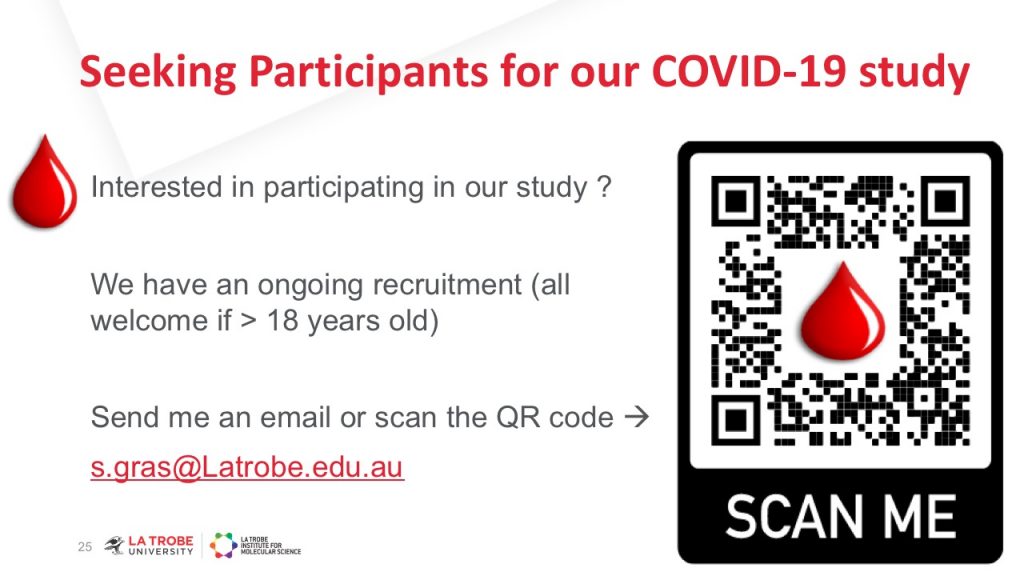Our Lab Research. Our lab is focused on understanding viral infections caused by viruses that pose a significant health burden to human (SARS-CoV-2, HIV, influenza …). We aim to understand why some individuals are at higher risk of developing severe infections from these viruses, while others seem to manage the virus effectively, thanks to an immune system that allows them to control the infection.
Our Research on SARS-CoV-2 Virus
As our lab focuses on viruses, since 2020, we have redirected part of our research efforts to study the new coronavirus responsible for COVID-19, namely SARS-CoV-2. We began investigating the immune response to SARS-CoV-2 and its variants. We collaborate with teams in Australia and overseas to thoroughly dissect the T cell, B cell, and antibody responses to the virus. Our goal was to map and characterise SARS-CoV-2 peptides that stimulate T cells to better understand the disease progression and the role of T cells in COVID-19. By mapping epitopes that activate T cells and characterising their molecular features, we aim to understand how the immune system molecule, HLA (human leukocyte antigens), presents these epitopes. This information can help predict which mutations might affect T cell recognition and quickly assess the impact of new SARS-CoV-2 variants on the immune system and immune protection.
We are also investigating the duration of protection provided by the current vaccination. Additionally, we aim to understand why some individuals experience more side effects after vaccination, while others remain asymptomatic despite testing positive for a SARS-CoV-2 infection.
Want to help advance research?
As part of our COVID-19 research, we are seeking help from our community to contribute to our biobank of blood samples. We are currently recruiting volunteers to donate blood after infections or vaccinations, or without infection or vaccination. The only requirements to participate are being over 18 years old and able to give blood.
If you are interested in taking part in our study please fill up the information in this link or scan the QR code below.

Our research on Influenza Virus
Influenza viruses cause significant morbidity and mortality worldwide. Although a vaccine is available, it primarily induces a humoral response and requires annual updates. The vaccine provides protection if the predicted strains match the circulating strains, but sometimes the virus mutates away from the prediction, rendering the vaccine less effective. Therefore, there is a need to develop a universal influenza vaccine that could provide long-lasting protection against various influenza strains globally. This would allow for a one-shot vaccine that protects against multiple strains without the need for yearly predictions, updates, or annual vaccinations. Our immune system includes CD8+ T cells, which are known to be protective against influenza, reducing viral load and disease severity.
Our aim is to understand how to isolate T cells that would be protective, identify their characteristics, and provide information on how to specifically activate these cells. Our lab has multiple projects focused on understanding immunity to the influenza virus:
Understanding how some T cells are able to recognise multiple mutations within the same epitope, enabling the immune system to protect us against different flu strains.
Discovering new flu epitopes that are activating potent T cells across individuals with different genetic backgrounds.
Determining the mode of action of drugs that target influenza.
Our research on HIV virus
While antiretroviral therapy (ART) has dramatically improved the health of HIV-infected individuals, comorbidities associated with persistent inflammation (e.g., cardiovascular disease, osteoporosis, cancer) have emerged as significant complications. It is unquestionable and imperative to develop new treatments (and ideally, a vaccine) for this virus. Therapeutics or a vaccine that could control HIV would help avoid damage caused by these comorbidities. Unfortunately, there are major hurdles imposed by HIV, such as high mutation and replication rates creating tremendous viral diversity, and the latent HIV reservoir established after infection, which are difficult to overcome.
To tackle these issues, our work will focus on a subset of individuals known as controllers, who are able to control HIV infection and/or delay disease progression. Although HIV infection impacts multiple facets of the immune system (including T cells, Natural Killer cells, Treg cells, among others), the strongest genetic links to HIV control identified so far are the expression of specific “protective” human leukocyte antigen (HLA) molecules and their associated potent T cell responses. Therefore, understanding these superior T cell responses at the molecular level—specifically, the interaction between HIV peptides presented by HLA complexes and T cell receptors—is crucial for informing therapeutic or vaccine development against HIV.
Our aim is to understand how HIV controllers T cells are protective, their functional but also molecular features, that could provide some information for new therapeutic avenues.
Structural Immunology
Our lab uses X-ray crystallography to understand the relationship between antigen-presenting cells (APCs) and T cells, which are responsible for recognising pathogens. The advantage of crystallography and structural biology is that we can visualise the atomic details of the molecules involved in these interactions. This allows us to identify important parts of each molecule and use this information to manipulate and modify the interactions.
To generate atomic structures, which are 3D models of our molecules, we first need to produce the proteins in large quantities, purify them to a very high level, and then crystallise them. Similar to the salt crystals on our kitchen table, but much smaller, we produce crystals with our proteins.
Structural biology has provided science with a powerful tool to observe the very fine details of protein and small molecule interactions. For example, it helps us understand how a small drug acts and interacts with its specific target.
Collaboration
We also collaborate with various groups on diverse projects related to immunology and structural biology. Our expertise in biochemistry, protein assays, immunology, and structural biology can be beneficial in exploring different fields and helping to answer various questions.
